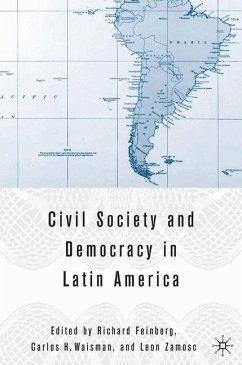A dense web of private associations drawn from multiple social classes, interest groups and value communities makes for a firm foundation for strong democracy. In Latin America today, will civil society improve the quality of democracy or will it foster political polarization and reverse recent progress? Distinguished theorists from the United States, Canada and Latin America explore the diverse impact of civil society on economic performance, political parties, and state institutions. In-depth and up-to-date country studies explore the consequences of civil society for the durability of democracy in three highly dynamic, controversial settings: Argentina, Brazil and Venezuela.
"Feinberg, Waisman and Zamosc are to be commended. Civil Society and Democracy in Latin America provides state-of-the art analyses by leading US and Latin American scholars who combine theoretical sophistication with well-executed case studies of civic activism and the new politics of citizenship in Argentina, Brazil, and Venezuela. This volume will be obligatory reading for sociologists and political scientists as well as for others interested in the role of social movements in the emergence of more vibrant and participatory democracies in Latin America." - William C. Smith, University of Miami, editor of Latin American Politics and Society
"This superb book addresses one of the most important issues of our time in Latin America: democratization, and the role of civil society in strengthening it. The essays address changes in the region both from a theoretical and empirical perspective. Case studies focus on Argentina, Brazil, and Venezuela, with their very interesting contrasting civil society experiences." - Susan Eckstein, Professor of Sociology at Boston University, Ex-President of the Latin American Studies Association
"This book offers a bountiful harvest of conceptual perspectives on the complex relationships between civil society and democracy set against the rich tapestry of contemporary Latin American politics and society." - Lester M. Salamon, Director of Center for Civil Society Studies, Institute for Policy Studies at Johns Hopkins University
"Does the current growth of civil society promote democracy? These essays significantly advance this discussion by addressing the crucial question of the many ways the ensembles of civil society organizations relate to politics. Rehearsing modest success and considerable weaknesses in Latin America, they show the variation between countries, between social sectors in individual countries, and even between issue-areas. They go a long way to replace enthusiasm and cynicism with a new and more productive realism." - Douglas Chalmers, Professor of Political Science, Columbia University
"This superb book addresses one of the most important issues of our time in Latin America: democratization, and the role of civil society in strengthening it. The essays address changes in the region both from a theoretical and empirical perspective. Case studies focus on Argentina, Brazil, and Venezuela, with their very interesting contrasting civil society experiences." - Susan Eckstein, Professor of Sociology at Boston University, Ex-President of the Latin American Studies Association
"This book offers a bountiful harvest of conceptual perspectives on the complex relationships between civil society and democracy set against the rich tapestry of contemporary Latin American politics and society." - Lester M. Salamon, Director of Center for Civil Society Studies, Institute for Policy Studies at Johns Hopkins University
"Does the current growth of civil society promote democracy? These essays significantly advance this discussion by addressing the crucial question of the many ways the ensembles of civil society organizations relate to politics. Rehearsing modest success and considerable weaknesses in Latin America, they show the variation between countries, between social sectors in individual countries, and even between issue-areas. They go a long way to replace enthusiasm and cynicism with a new and more productive realism." - Douglas Chalmers, Professor of Political Science, Columbia University








